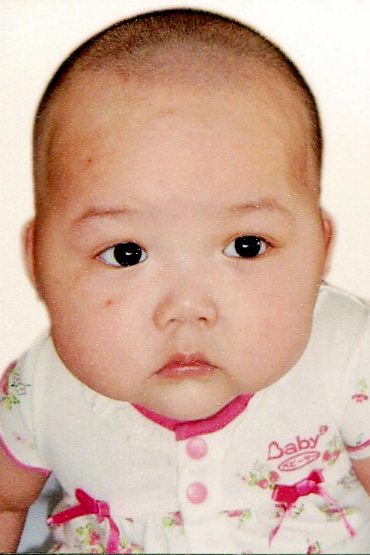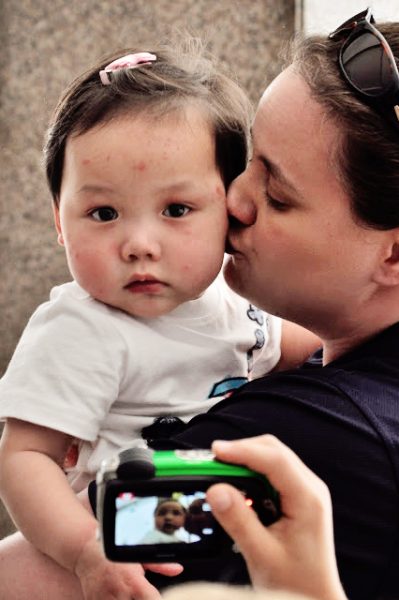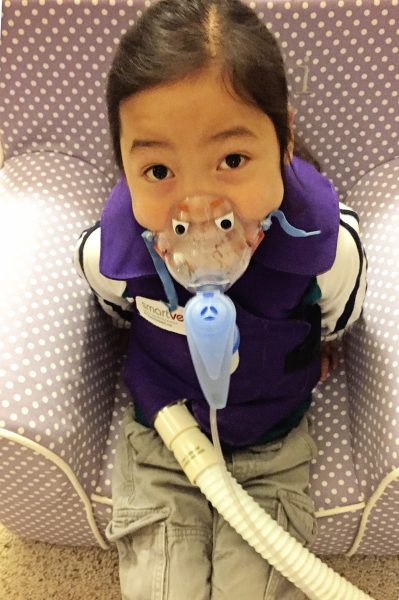When you visit a carnival, some rides are very predictable. The frog hopper, bumper cars, flying elephants, and even the tea cups come with a high level of predictability. You hand over the ticket and, with almost 100% certainty, you can foresee what the outcome of the ride will be… steady, smooth, and timely.
Then there are the thrill rides where you are not quite sure what is going to happen. It’s fast, dark and there are corners and walls which prevent you from knowing what is coming. You don’t know when you might drop, accelerate, stall, or spin out of control. It’s unpredictable and exciting, all at the same time.
To me, international adoption merges the two types of rides. One minute you are circling in an orderly fashion, and the next, you are dropping with acceleration down a dark tunnel not knowing where the ride might take you.
We have adopted twice internationally. Both times, we were educated and prepared for the curves, twists, and turns of international adoption. Our first adoption from Vietnam was a kiddie ride. While we equipped ourselves for the worst, everything was essentially smooth sailing. We didn’t realize at the time how easily our first daughter assimilated into our lives. With our second adoption from China, things were very different.
Our second adoption experience was much more of a thrill ride.
When we started our second adoption, we felt very confident in the decision to adopt a child with “special needs”. We did quite a bit of research, talked, prayed, and spoke with our pediatrician and social worker about the needs we felt might be best for our family. We felt very knowledgeable when filling out the medical conditions checklist (MCC). We were open to lots of needs, and we felt that the conditions we checked were all very manageable.
Three days after our dossier log in date (LID) in China, we received a match for an 11-month-old girl with a “minor” heart defect. Her medical file described her as having normal cognition, growing at a steady rate, and meeting all developmental milestones. She was adorable, had chubby cheeks, a shaved bald head, and we knew that she was our daughter. At the time of referral, I had been a pediatric nurse for 17 years and a Nurse Practitioner for 11 years. I had reviewed many medical records of ill children, and this baby did not appear sick… not on paper and not in photos.

Our pediatrician said that our daughter might require one surgery when she arrived home but may need no medical intervention for her heart. We left for China expecting predictable orphanage delays, conditions, and behaviors. We didn’t plan to care for a sick baby. I didn’t even take a stethoscope.
On our “Gotcha Day”, we spent the morning eating breakfast, laughing, and packing a diaper bag. We discussed that she would likely scream and not want any of us. We expected her to grieve everything she was leaving. It never crossed our minds that she would be very ill and need immediate medical attention.
When they placed Meili in my arms, I instantly knew something was not right. Her breathing was labored, she had a wet cough, thick secretions, retractions, and I could hear abnormal breath sounds just holding her. I remember looking at my husband and telling him that something was amiss. We asked the two escorts from the orphanage if she was sick. They explained to us she had a “cold” and they gave us a few packets of herbs, instructing us to make a tea using the powder and give it to her twice a day. They mentioned that she, “got lots of colds,” but otherwise she was a healthy baby.
Her symptoms and presentation suggested otherwise.
We visited an international medical clinic within 12 hours of meeting her. The physician told us she had pneumonia, an ear and sinus infection, and gave us breathing treatments and medications to get us home. Our goal, like most adoptive families, was to survive in China. We hadn’t expected a sick baby, but we felt with the medications prescribed that she would be feeling better and symptom-free by the time we flew home.

Unfortunately, Meili continued to have respiratory symptoms throughout our time in China. She had a constant wet cough and periods of respiratory distress. She made her first trip to the Children’s Hospital for diagnostics and workup within 24 hours of arriving back in the United States. Initial testing showed a collapsed lung and double pneumonia. The physicians felt her symptoms were the sequelae of the acute illness that she brought from China. They believed as we did that, after completing a prescribed course of treatment, she would be well.
This was not the case.
Despite round-the-clock breathing treatments, antibiotics, and steroids, she continued to have lung issues. She maintained a wet cough, persistent drainage, and sounded like an old lady who had smoked her entire life. Her chest continuously rattled, and her cough seemed to be weak and ineffective.
Within three months of being home, we saw at least five specialists. It was clear that what she was experiencing was no acute illness. Cardiologists cleared her of heart issues. Gastrologists ruled out reflux or GI issues, and Otolaryngology ruled out structural problems. Pulmonologists ruled out Cystic Fibrosis but really couldn’t determine what was going on.
The first answer we had about Meili’s condition came after about six months home.
A swallow study showed that Meili had dysphagia. She was having silent aspiration occurring as she swallowed liquids. We didn’t know why Meili was aspirating, but knowing this information certainly helped explain what might be causing her persistent pneumonia and breathing issues.
The theory was that due to bottle propping and large-holed nipple use in the orphanage that she did not develop a mature suck and swallow mechanism. The pulmonologist felt that the damage to her lungs would heal once the chronic aspiration stopped. We also believed that with time, healing and maturity, the persistent lung issues would dissipate. We started swallowing therapy and entered the world of thickened fluids.
When a child has dysphagia, the mainstay of treatment is thickening all liquid intake. With Meili’s diagnosis of dysphagia, we were told to start thickening everything she drank to a honey-thick consistency. Our older kids were totally grossed out and referred to all Meili’s liquids as “sludge.” Honestly, her fluids do look a lot like sludge.
Getting her to drink the thickened liquids is not the hard part. The most difficult part of thickening liquids is always having to plan ahead. There is no ordering a juice box at a restaurant or using water fountains. There’s no grabbing a drink while you are out and about. All fluids are mixed with a thickening agent and all family members, daycare workers, and church staff must understand that there are no thin liquids allowed.
Despite the dysphagia diagnosis and thickening all fluids, three years later, things were not improved. No one thought that as Meili approached five-years-old that we would still have daily lung issues. The theory that she would “grow out of this” was quickly fading. Thickening all liquids resulted in fewer episodes of aspiration and pneumonia; however, she still had a daily wet cough, and she was still frequently sick with respiratory illnesses. There was just no resolve, no real answer, and no label. It was very frustrating.
Living in a land of unknowns feels, at times, like a spiraling thrill ride with no end in sight.
Right around the time we were celebrating three-and-a-half years since “Gotcha Day”, we finally got a medical diagnosis that helped us define and connect the health issues Meili was having.
Meili was diagnosed with Bronchiectasis, a chronic lung condition causing widened and damaged air passages. Essentially, her cough and bronchi do not effectively clear mucous from her lungs. While it felt great to have a conclusive diagnosis, it is hard to hear words like “chronic” and “lifelong”. Bronchiectasis is treatable, but it cannot be cured.

The words dysphagia and bronchiectasis do not define Meili or our family; however, they do take up a lot of time and family focus. Her pulmonary regimen includes twice (or more) daily chest physical therapy. She wears an oscillation vest that percusses her chest (imagine bongo drums beating on your kid’s chest) for thirty minutes at a time. This process helps her clear thick secretions and keeps the airways as healthy as possible. She also has multiple daily breathing treatments, and we aggressively treat any colds or respiratory infections so that they don’t turn into something more serious. We see the pulmonologist several times a year for follow-up and pulmonary function testing.
We cannot predict how bronchiectasis might impact Meili’s health throughout her life. Different patients have more or fewer complications than others. The best prognosis and outcomes will come with diligence and commitment to daily treatments and therapies. This may become more challenging as Meili gets older and takes on more control and autonomy of her care.
People ask us all the time if we knew Meili had lung problems when we agreed to adopt her. The honest answer to that question is no, we didn’t know (or suspect) that Meili had lung issues. Dysphagia and bronchiectasis were not even options we could have checked on our medical conditions checklist (MCC). No one, to my knowledge, has the option of choosing these diagnoses.
What we have learned is that filling out a medical conditions checklist (MCC) and accepting the referral of a child with an identified medical need is a bit like a carnival ride. You may think that you know what’s going to happen and try to predict how life will go, but there is still a high level of unpredictability that may present itself.
Gotcha Day is filled with many unknowns. Whether it be medical, social, or developmental, different issues will arise. Parents must step forward, tickets in hand, and be ready for whatever ride leaves the platform.
When we started Meili’s adoption, we thought we were boarding a kiddie ride.
How surprised we were that our trip took an exciting turn and became a thrill ride. We believe that God knew what Meili needed and exactly what our family needed. Meili entered our lives like a little Tasmanian devil. She never stops. We often joke about how wild and crazy she would be if she had full lung capacity and oxygenation.
Her “special needs” were unpredictable. They still are. We don’t know what complications lie ahead, but we do know that we are “all in” and ready to tackle whatever life and bronchiectasis presents. We are surrounding ourselves with skilled specialists and a team that will help us aggressively fight any and all complications. We feel fortunate to have been the family chosen to live this life with Meili.
Those considering international adoption must be ready to board an unpredictable ride. The process is not for the faint of heart and should come with warnings much as thrill rides do.
I think about Meili’s adoption and parenting her like the ultimate roller-coaster ride. There is a track in front of us and one behind us. There will be twists and turns, but we believe that we will ultimately be brought back safely to the platform….to a place that is better than where we started.

We are led by trust in something bigger than ourselves, and there is comfort in that faith.
For those who worry about the thrill rides, don’t be afraid of the unpredictability. Step up, buy your tickets, and buckle up. Undoubtedly, it will be the greatest choice and best adventure you will ever experience.
– guest post by Amy: blog || email

























Hello I have a son with the same medical problems. I would like to know if you have any suggestions (he is 4) as we enter the school system?